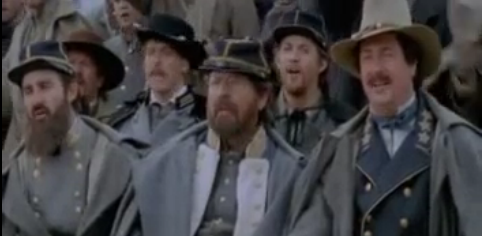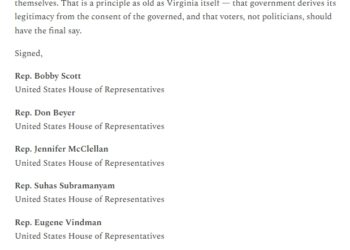 Often, when politicians parade out military and veterans, it is uninformed pandering. Active duty members have served as shields to buffer misbegotten strategy for a decade. Veterans are useful symbols adorning campaign literature and appearances. But Governor Kaine’s Norfolk veterans’ round-table was a very welcome departure from the norm.
Often, when politicians parade out military and veterans, it is uninformed pandering. Active duty members have served as shields to buffer misbegotten strategy for a decade. Veterans are useful symbols adorning campaign literature and appearances. But Governor Kaine’s Norfolk veterans’ round-table was a very welcome departure from the norm.
Kaine told the group he was there to “get up to speed for the job that he hopes to have come January.” Looking forward, he hopes to pick up Jim Webb’s military and veterans portfolio when he enters the Senate and provide continuity to the efforts of predecessors John Warner and Webb. Mark Warner, who will be the senior Senator from Virginia has his own set of interests on the commerce and banking side. So, Kaine believes he can build upon his experience as the state executive by hearing from veterans about Federal issues facing the military and veterans.
Though Kaine did not serve in the military, as Governor during two active wars his role as Commander in Chief of the Guard became a significant part of the job including trips to the theater and, sadly, attending too many funerals. This led to a passion for the issues involving the guard, reserves, veterans, and military families. While he had no role in making the conditions of war any better he did work with the legislature to make Virginia a better place for those affected by the wars. One of the only parts of Virginia government that grew during his term as governor was the Department of Veterans Services. One other aspect of his life that stokes the passion for these issues is the fact that his son will graduate from college this semester and be commissioned as an officer in the Marine Corps.
The discussion ranged from the effects of deployments on families to the more mundane problems faced by families during change of station transfers and from the economy’s effect on veterans returning to the workforce to the challenges of obtaining promised medical and education benefits. An overstressed Veterans Administration came in for a great deal of discussion as did the often interrelated issues of mental health care, homelessness, and incarceration. Every one of these items share the same nexus: transition, whether it be while on active duty, leaving active duty, or afterwards as veterans.
Kaine identified one distinguishing feature of veterans’ issues: they occur in every zip code, many of which are simply without services and many in which veteran’s issues are an anomaly. When veterans in these locations encounter problems, whether unemployment or mental health, there is often no one aware there are resources available to them or even think to ask if the individual is a veteran.
 Kaine did hear a lot of nuts and bolts issues from the group. The group left with the sense he made the effort and took the time to understand their perspectives, appreciating their recommendations. This is clearly an area that is not George Allen’s long suit. Of course, George Allen does have one accomplishment Kaine cannot claim. He is a veteran of a civil war film.
Kaine did hear a lot of nuts and bolts issues from the group. The group left with the sense he made the effort and took the time to understand their perspectives, appreciating their recommendations. This is clearly an area that is not George Allen’s long suit. Of course, George Allen does have one accomplishment Kaine cannot claim. He is a veteran of a civil war film.

![[UPDATED with Official Announcement] Audio: VA Del. Dan Helmer Says He’s Running for Congress in the Newly Drawn VA07, Has “the endorsement of 40 [House of Delegates] colleagues”](https://bluevirginia.us/wp-content/uploads/2026/02/helmermontage.jpg)
















